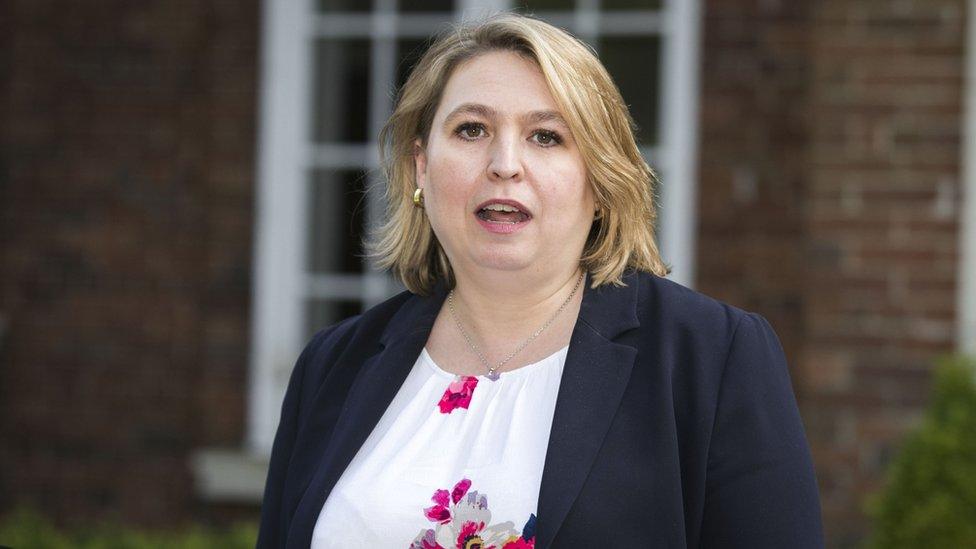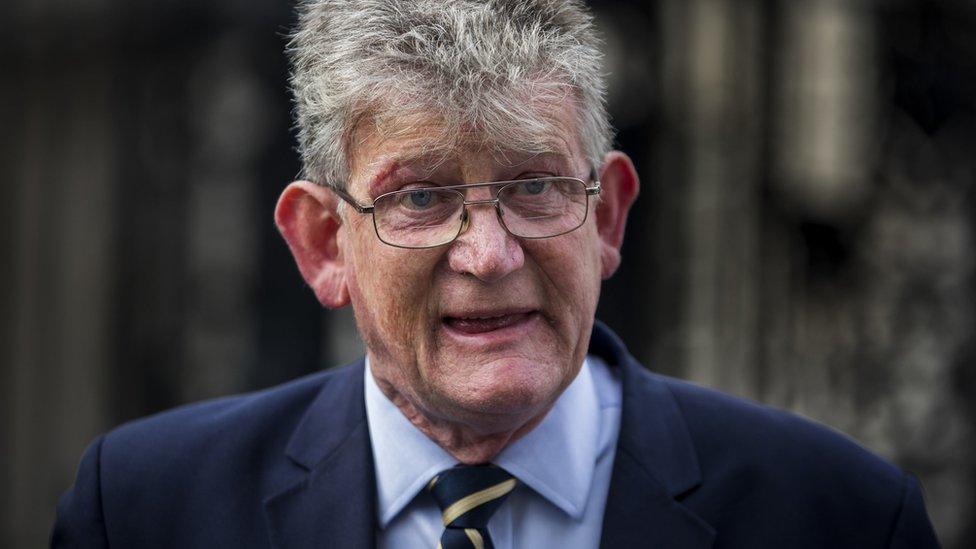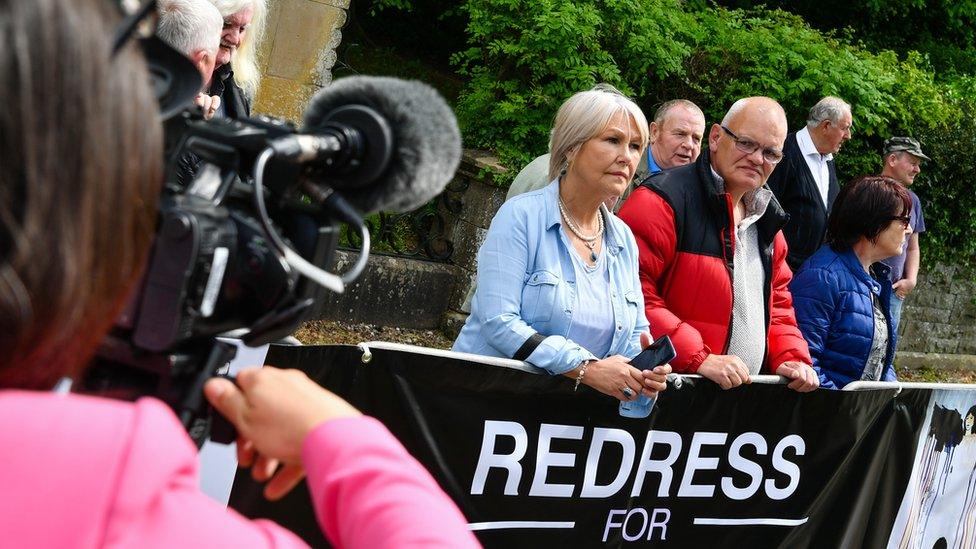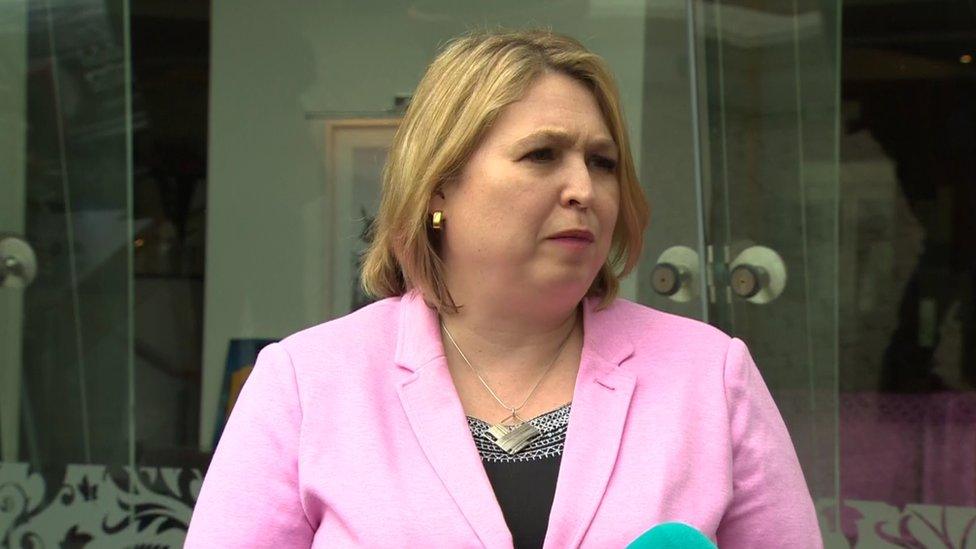Historical abuse: 'Two-year wait' for compensation payments
- Published

Karen Bradley has been urged to help abuse victims "without further delay"
Victims of institutional abuse may have to wait up to two years before their compensation claims are processed, senior civil servants have warned.
In a paper circulated to Stormont's political parties, the Executive Office has suggested it could take that time to get the redress board operational.
The board will be responsible for approving claims for compensation.
But campaigners have argued that interim payments should be made to victims who are most in need.
The 24-page discussion document seen by the BBC sets out the responses from the consultation process along side analysis from the Executive Office.
The document focuses on 11 "issues" arising from the public consultation process on the recommendations from the Historical Institutional Abuse (HIA) Inquiry, which was chaired by Sir Anthony Hart.

Inquiry chair Sir Anthony Hart recommended that abuse victims should be compensated
The public inquiry examined abuse at children's homes and other residential institutions run by the state, churches and charities.
Sir Anthony's recommendations - put forward in 2017 - included compensation for victims, a memorial and a public apology to abuse survivors.
These issues addressed in the discussion document include:
the level of compensation payout
the make-up of the redress board to deal with claims
the powers of the commissioner who will work on behalf of victims
the make-up of the advisory panel that will advise the commissioner's office
The paperwork also includes analysis from the Executive Office on each point.
'Compensation value depreciating'
It points out that the £7,500 recommended minimum compensation payment was the most significant issue raised by victims and survivors
"There is a strong view that this minimum amount is inadequate to compensate for the experience of living in an abusive environment," the paper states.

Jon McCourt says victims have little hope of getting compensation
The Executive Office added that it would be difficult to "justify awarding a lesser payment" to victims and survivors than that being paid out in a similar scheme in Scotland, where the minimum payment is £10,000.
It also pointed out that the value of £7,500 has deprecated since the payout was recommended.
"Over two years have elapsed since the inquiry report was published and the likelihood is that it will be at least another one to two years before the redress board is operational," it adds.
"Hence the value of £7,500 is depreciating."
A senior civil service source said the Stormont parties will meet again on Wednesday and will likely put forward their response to the 11 issues - and that the executive office would move quickly to put that information back to Karen Bradley.

Analysis: Jayne McCormack, BBC News NI political reporter
Two very different narratives have emerged over the past 24 hours.
The political parties are adamant they were given four issues relating to HIA to reach agreement on.
They say they did that on Monday, only to be faced with an extra 11 issues to consider.
But that is not how the Northern Ireland Office sees it.
It says there were always more than four issues to consult on and that the new 24-page document came from the Executive Office - not Karen Bradley.
It was indeed issued by the Executive Office - but at whose request?
Civil servants only have the power to advise - it is ministers who take decisions.
And right now, with the Stormont assembly and executive suspended, it is Karen Bradley who will have the final say on the matter.

On Monday, Northern Ireland Secretary Karen Bradley was accused of using delaying tactics to stall legislation to compensate victims of institutional abuse.
Marty Adams, from the victims' group Survivors Together, met Mrs Bradley and asked her to resign during his meeting with her.

A small group of campaigners protested outside the NI secretary's garden party in Enniskillen on Tuesday afternoon
He said he entered the meeting feeling positive but felt that she showed no compassion during it.
She did not have answers when it was put to her that she was using "stalling tactics," said Mr Adams.
"To me she is using victims as a political football," he added.
"But we believe... that there is a channel for victims.
"We are left with nothing else - we don't have a government.
"We can't be sitting waiting for Sinn Féin and the DUP to do a deal," he said.
- Published20 May 2019
